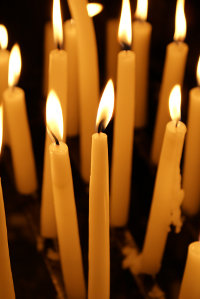
I have “found,” at least for me, a linkage between prayer and contrition. Specifically how prayer can lead to “more perfect” contrition (for lack of a better description).
Contrition is sorrow for one’s sins and is required for God’s forgiveness. But why should we care? Basically two reasons: (1) fear of damnation and (2) because we have turned away from God by failing to give Him the complete love He deserves. When our contrition is perfect, our sorrow is 100% and completely for the latter reason.
Mortal sins (see What harm is a little sin?) may be forgiven through perfect contrition. Actual perfect contrition is uncommon. If it were the only means to receive forgiveness for mortal sins then our situation would be very sad indeed. Fortunately, Jesus gave us the Sacrament of Reconciliation. Through this sacrament we can receive absolution for our sins even though our contrition is imperfect.
Perfect contrition is difficult because the sorrow is based only on the severed relationship with God. Sorrows focused, even partially, on ourselves are imperfections. Will I be damned to hell? How much time will this cost me in purgatory? I am 99% sorry but he/she deserved it (for what they did to me). I am sorry I did it, but can not honestly promise that I will not do it again (i.e. I reserve the right to do it again).
Due to our fallen nature, it is understandable that our contrition is imperfect – at least somewhat self-centered vs. completely God-centered. Yet we should not be satisfied. Our personal struggle for holiness is reflected in our reaction to our sins and how we pray deepens our relationship with Our Lord.
The Catechism teaches that there are several types of prayer. For the moment, I would like to focus on two: petition and thanksgiving.
Prayers of petition are requests to God for ourselves, our families and others. This is probably the most common type of prayer. Some feel that asking God for something lacks acceptance of His will. Others feel that it is alright to ask for the needs of others but not for themselves. Baloney! God wants us to ask him for things, to need Him and not to fall into a false notion that we are self-sufficient.
Most Christians rightly have no reservations in making prayers of petition and do so often. I know I do. I pray for repose of the souls of my parents, other family members and many others. I pray for healing of the sick. I pray for protection of family and friends when they travel or in any potential danger. I pray for the spiritual needs of many and I pray for the material needs of those who are struggling. In short, I pray for a lot of things and I know that my prayers are heard and answered in accordance with God’s will.
While I am sincerely thankful and have also made prayers of thanksgiving, I have been focusing on this more lately. Specifically, I have been trying to be as detailed and specific in my prayers of thanks as I am for my petitions. I give thanks for the many blessings in my life, specifically. I give thanks for the answered prayers of my previous petitions – even if I do not know those answers.
This takes time and I don’t always do it as well as I hope to. The more I do, the more aware I am of my many blessings and conscious of God’s love and attention to me. I become closer to God and my love for Him deepens. How powerful that is!
The consequence of sin, against God (as all sin is), is clearer. The God who has literally given me everything. The God who hears and answers every prayer. This is the God whom I sin against. My focus shifts from how this sin effects me to the sorrow rightly due to sinning against God Himself. The contrition I feel becomes “more perfect.”
O my God, I am heartily sorry for having offended Thee,
and I detest all my sins, because of Thy just punishments,
but most of all because they offend Thee, my God,
who art all-good and deserving of all my love.
I firmly resolve, with the help of Thy grace,
to sin no more and to avoid the near occasions of sin.
Amen.Act of Contrition, my favorite version
as seen in the 1945 Baltimore Catechism


























Share Your Thoughts